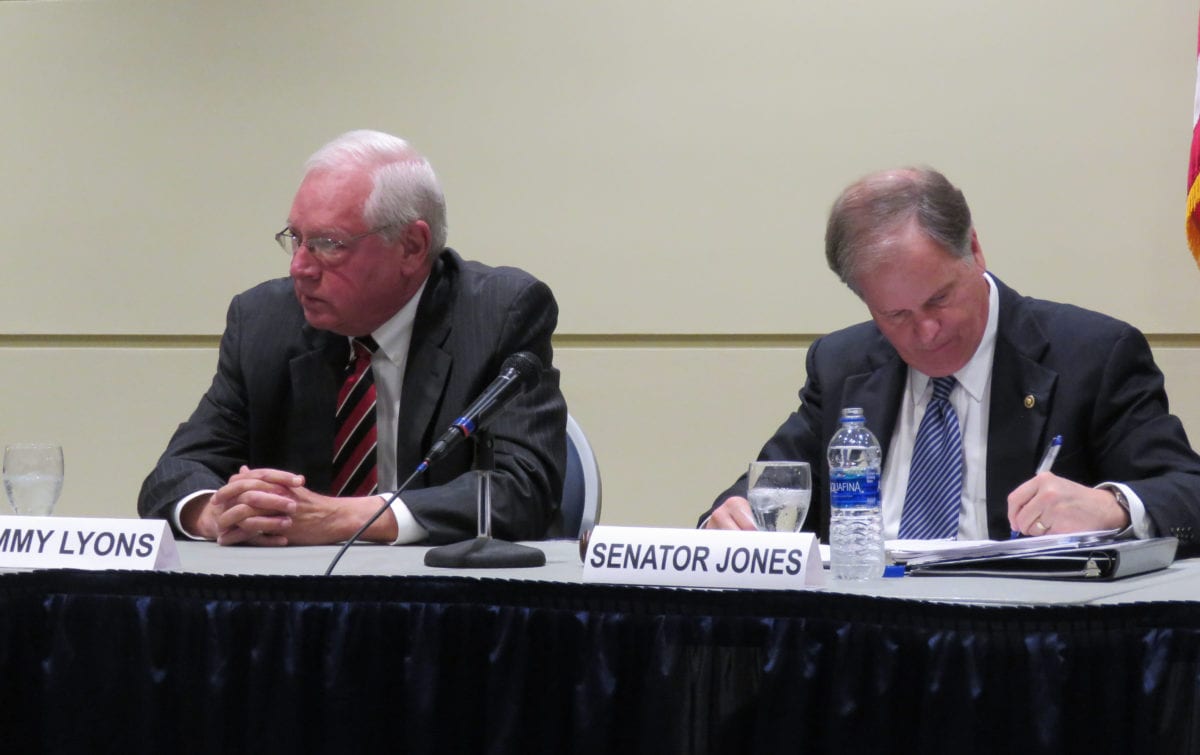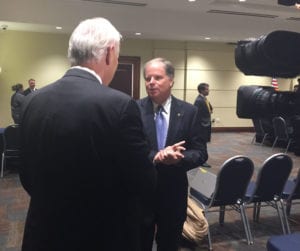
Jimmy Lyons, Alabama Port Authority (left) with U.S. Senator Doug Jones at a USA roundtable on tariffs and trade: Glynn Wilson
Sample banner ad: Your company could have an ad on this site like this. Click here to see how — >
By Glynn Wilson –
MOBILE, Ala. – Nowhere in the country are people more supportive of the president than Alabama, yet they may be the first people hardest hit by Donald Trump’s Twitter trade war.
There was consensus about the ongoing trade war in the room at the University of South Alabama Student Center Ballroom on Monday, when U.S. Senator Doug Jones came to town and met with major business and agricultural leaders in a special hearing of the Senate Committee on Homeland Security and Governmental Affairs. Officially it was a “roundtable discussion,” less formal than a Senate committee hearing, but it will become part of the federal record.
With the exception of a couple of representatives from steel companies, who say they are making a comeback thanks to Trump’s 25 percent tariff on imported steel, the consensus was that a president setting international trade policy by Twitter tweet is “crazy,” and a trade war on automobiles under the auspices of national security is creating such uncertainty that thousands of jobs and billions of dollars in new investments are at risk.
At the same time, the new tariffs on farm products are on the verge of putting many large family farms totally out of business, threatening the U.S. food supply.
There was some hope expressed that perhaps Congress might find a way to come together and bring sanity and stability to the trade table. But there was not much optimism in the room.
Senator Doug Jones said it is possible Congress could move to step in more if the president doesn’t come around.
“We’ve got the purse strings,” Jones said. “There are some things that we’re doing. The two bills we’ve introduced would be a step to try to influence things.”
Back in June, Senator Jones crossed party lines on this issue and hooked with Republican Lamar Alexander of Tennessee, sending a letter to U.S. Department of Commerce Secretary Wilbur Ross urging him to reconsider the 25-percent auto tariffs, pointing to the damage it would do to the economies of the states.
Full coverage: U.S. Senators Doug Jones, Lamar Alexander Push Back on Trump Trade Wars and Tariffs
Then they followed up with bipartisan legislation to delay the auto tariffs until completion of a study to examine the impacts these tariffs would have on the automotive industry.
Full coverage: U.S. Senator Doug Jones Introduces Legislation to Delay Trump’s Proposed Auto Tariffs
Senator Jones also teamed up with Republican Senators Rob Portman from Ohio and Joni Ernst of Iowa to introduce legislation requiring that the Department of Defense, not the Department of Commerce, justify the national security basis for new tariffs under what is referred to as Section 232.
“There’s been some talk in both houses of doing more,” Jones said, “and in fact taking some of that authority away from the administration.”
“I think that’s a drastic step. We don’t really need to go there right now,” he said. “I like the idea of an administration being able to kind of set the policy on trade. But if things don’t move faster, if we don’t get markets back open and clear up the uncertainty, I think Congress will step in a little bit more because they are going to hear more about people we’ve got here that are hurting.
“Especially our farmers,” he continued, “that can’t expand because of the uncertainty. That’s the biggest issue everybody’s facing right now. I’m sure Congress is going to give this a little bit more time, but I think the time is running out.”
For farmers, who were some of Trump’s most ardent supporters, they are already feeling the effects and some may be out of business soon, including those in Mobile and Baldwin Counties, if some compromise is not reached.
In response to Trump’s tariffs, China imposed a 25 tax on soybeans. Active orders in Alabama and around the country evaporated overnight. The soybean farmers are being forced to store their crops with hopes of finding new clients, maybe in Canada or Mexico, if a new agreement can be signed on the deal to replace NAFTA.
For Mark Kaiser, a farmer in Seminole, Alabama who grows peanuts, soybeans and cotton, the situation is dire and something must be done soon or he and other farmers may have to call it quits.
“Soybeans are probably one of our largest crops that we export and our largest customer is China. We’re down 98-percent for the year,” Kaiser testified. “Those soybeans are produced and they’re going into storage now. Farmers are holding onto them.
“I don’t know what’s going to happen if China doesn’t go to the table and start buying, but they’re going to Brazil. Brazil’s going to be harvesting by the end of December,” he said. “They may totally take us out of the market and we’ve been working on this market for 20 years. We’re in a situation where we’re taking the brunt of this tariff war right now and we’re the least prepared to do it.”
Daniel Penry, a farmer in Daphne who also grows peanuts, soybeans and sweet potatoes, said he may have to sell his land for a housing development if the president doesn’t back off or markets are not stabilized somehow by Congress.
Penry said his farm has been struggling since 2014 with low prices.
“Prices have just been down, down, down. We’ve got neighbors that have quit and gone on and done something else,” he said. “Things are bad in agriculture and they have been for a while. I know that it’s a matter of national security that we be able to grow our own food so we can eat.”
In his opening remarks, Senator Jones said he was troubled by the growing global trade war, “not least because of the high cost to Alabama citizens.”
“Alabama is an exporting state. More than 560,000 Alabama jobs are supported by trade,” Jones said. “Our farmers send their crops across the globe and we are the third-highest exporter of automobiles….I have heard estimates from the U.S. Chamber of Commerce that the trade war could have an impact on as much as $4.4 billion in Alabama exports.”
Representatives from Mercedes-Benz, Toyota, Honda and Hyundai all testified that the biggest problem they face is the uncertainty created by all the tariffs or taxes imposed by Trump and foreign competitors like China, making it nearly impossible to conduct long-term capital investment planning. If these issues are not resolved in a way that promotes at least fair trade, if not free trade, jobs could be lost.
The price of cars and trucks would go up and lead to a reduction in demand. That would cause long-term ripples in the economy that could stall or suspend the growth trend and create an economic downturn that could lead to a global recession.
Robert Burns represented Hyundai, Rick Clementz was there for Mercedes-Benz, Allyson Edwards handled Honda’s presentation and David Fernandes spoke for Toyota.
“The potential cumulative impact of new trade policies is unsettling for those in our industry who make decisions about future investment. This uncertainty about future cost in an industry with long product lead times adds risk to doing business in the U.S.,” Edwards testified. She’s an Alabama native and assistant manager of Honda Manufacturing of Alabama.
“Unfortunately, Honda has been impacted by a number of trade actions,” Edwards said. “Despite our local [steel] purchases, the tariffs represent hundreds of millions of dollars in added cost … imposing tariffs here will put American workers, American consumers, American communities and the American economy at risk.”
David Fernandes, president of Toyota Motor Manufacturing Alabama, Inc., said tariffs are just another way of saying taxes.
“We know the impact of taxes on our entire industry. We are already seeing it in the steel and aluminum tariffs that went into effect earlier this year under (the) Section 232 provision of the U.S. Department of Commerce,” Fernandes testified. “Now, we’re here about import tariffs on vehicles and auto parts, and the idea that our imports are a national security [threat] and, personally, that is very frustrating.
“The idea that 137,000 hard-working Americans at our facilities, our supplier network, and our dealers across the country could be considered a national threat — that’s impossible,” he said. “But beyond that, tacking a 25-percent tax on car parts in the U.S. is a direct hit by the government on an otherwise healthy industry — an industry that is been a driving force in America for more than 100 years. The bottom line is that prices will go up.”
Mike Lee of Nucor Steel in Decatur and Brent Sansing with U.S. Steel in Birmingham both seemed pleased with Trump’s trade policy on steel. Both companies are planning comebacks from lost business to cheaper foreign imports of steel in recent years, although they admitted that the uncertainty in the markets could have a long term impact on them if it hurts investments in the domestic automotive industry.
Jimmy Lyons, director of the State Port Authority who has to deal with the import and export of farm products, metallurgical coal, oil, steel, cars and trucks, said we are just beginning to see the impacts of the unnecessary trade war.
“It is going to be much more impactful than it has been to date,” he testified. “We’ve seen it in grain. We’ve seen it in our steel exports. We’ve seen orders cancelled. We’ve even seen metallurgical coal shipments cease to at least one country who’s been subject to the steel tariffs. The effects are far-reaching and it’s created an environment of uncertainty in business …
“Ultimately one of the concerns that we have is the potential inflationary impact of these new taxes, which is exactly what they are,” he said. “You can call them ‘tariffs,’ but they’re taxes. These tariffs and taxes are eventually going to fall on the shoulders of the American people.”
When interviewed after the hearing, Mr. Lyons was even more explicit about the president’s practice of setting national trade policy and starting trade wars by Twitter tweet.
“Four o’clock in the morning policy announcements (on Twitter) are crazy. It’s beyond me,” he said. “I don’t believe in it, but I don’t think you are going to see a change with this president.”
When asked what should be done about it, he said: “I don’t know. I guess we will find out in two years.”
“I think the Congress is too divided to really have an impact,” Lyons said. “The country’s divided.”
When asked what people can do, he said: “Go to the polls in two years.”
Background
A large majority of the people of Alabama voted to elect Donald Trump president, 63 percent to 35 percent for Democrat Hillary Clinton, only coming in second to Wyoming where Trump got 70 percent of the vote: 2016 Election Map.
The people of Alabama still support Mr. Trump more than any other state. Nothing has changed since the election. His approval rating matches his vote, still standing at 62 percent in January and October who approve of the job he is doing with 34 in the disapproval range, up in October from 26 percent in January: Trump’s Approval.
Could this be another example of people voting against their best interest in a big way?
Why Do Working Class People Vote Against Their Economic Interests?
A video of the hearing is available here.
Sample banner ad: Your company could have an ad on this site like this. Click here to see how — >
















Clear, thorough report — and also outed state port authority director as anti-Trumper.
So? He is entitled to his opinion I guess it is hard to watch people he associates with starve. But you go right ahead.
I am proud of his statement. Congratulations, Mr. Lyons and Sen. Jones. With you completely, and with the suffering farmers, as well. Trump does nothing to help any of us!